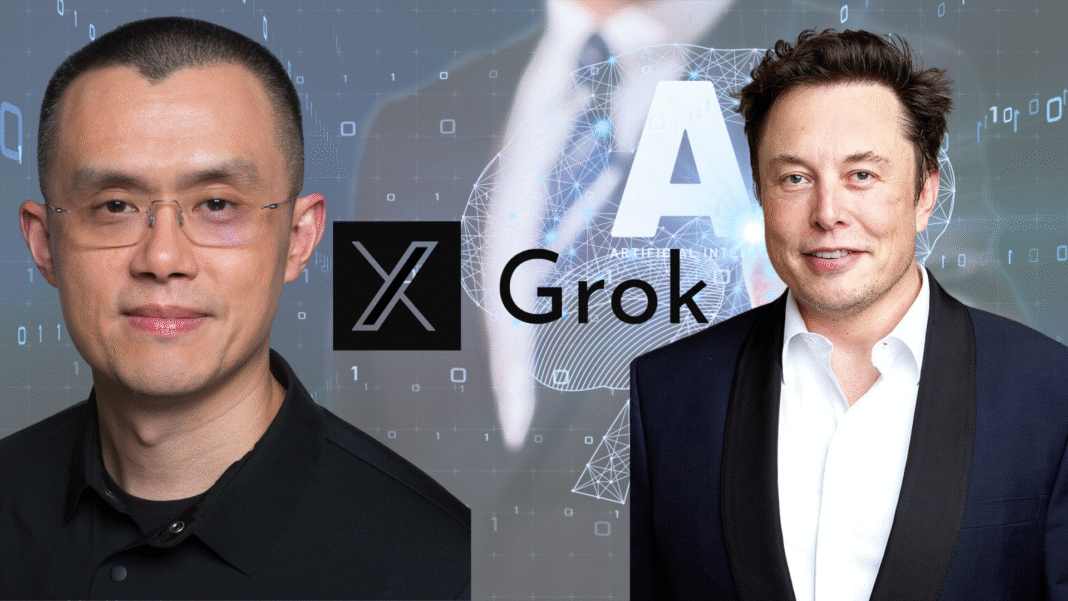Changpeng Zhao, known as CZ, took to his X(Twitter) account to weigh in on Elon Musk’s announcement about the upcoming Grok 3.5 AI model. Musk said the new version will “rewrite and clean the entire corpus of human knowledge,” fixing errors and adding missing data.
CZ quoted Musk’s post, writing “Will be fun to see how this plays out,” and reminded followers that history and opinions come in many versions and are often debated.
Musk’s Ambitious Vision
Elon Musk’s xAI team plans to build Grok 3.5 with advanced reasoning and inference abilities. The goal is to retrain the model on a revised set of texts that have been cleaned up.
Musk argues that today’s AI foundation models learn from uncorrected data full of “garbage.” By rewriting the world’s knowledge, he hopes Grok can go beyond simply retrieving facts and start generating new insights.
Community Reactions
Web3 leaders quickly joined the debate. Binance’s Cas Abbé warned of a dystopian future if AI gains too much control over the truth.
Other users joked that Musk should name the model Grok 4.20 in honour of his love for the number 420 and April 20, a day celebrated by Dogecoin fans. The chatter shows both excitement and scepticism about giving one system power to reshape all information.
How Grok 3.5 Works?
Grok 3.5 aims to act more like a scientist than a search engine. Its architecture likely includes larger context windows and uses reinforcement learning from human feedback.
This lets the model infer new ideas and fill in gaps in data. Researchers say it could brainstorm solutions to unsolved problems, from new drug compounds to climate fixes.
Its creators hope that by fixing flawed data first, Grok will avoid common AI mistakes like hallucinations.
Promises and Pitfalls
The new model could speed up research and spark fresh discoveries in fields with little existing data. It might suggest novel angles on tough challenges. Yet there are worries about trusting an AI that writes its own version of history or science.
If Grok makes unsupported claims or deletes valid viewpoints, it could mislead users. The debate underlines a key tension: how to balance AI innovation with safeguards against bias and error.
CZ’s Deepfake Alert
Just a day before commenting on Musk’s plan, CZ warned of rising deepfake hacks. He noted that video call checks will soon fail as AI tricks grow more convincing.
Users should avoid installing software from links in messages, even if they seem to come from friends. CZ reminded people that attackers often hijack genuine accounts to spread malware or steal data. His warning highlights how AI both empowers and endangers the online world.
Sam Altman and Elon Musk on AI Race
Elon Musk’s Grok and Sam Altman’s OpenAI are now in a head‑to‑head battle to lead the AI field. Musk argues his xAI models offer more freedom, while Altman insists on safer, well‑governed systems.
Their feud began in 2018 when Musk left OpenAI over disagreements on computing power and control. Today, both camps race to win developers and users with advanced reasoning and security features. This rivalry drives rapid innovation but also raises worries about unchecked competition in AI.
Wide‑Ranging Impact
Musk’s push to clean up data reflects a wider move in AI toward quality over quantity. Firms now race to refine training sets and add human oversight. At the same time, regulators and ethicists press for rules on AI’s role in shaping beliefs and culture.
Grok 3.5 sits at the heart of that debate. If it succeeds, it could change how we learn, research, and decide what counts as fact. If it fails, it may deepen fears about AI controlling our shared story.


